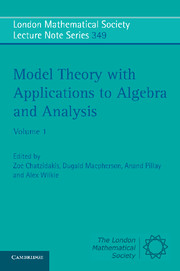Book contents
- Frontmatter
- Contents
- Preface
- Contributors
- Model theory and stability theory, with applications in differential algebra and algebraic geometry
- Differential algebra and generalizations of Grothendieck's conjecture on the arithmetic of linear differential equations
- Schanuel's conjecture for non-isoconstant elliptic curves over function fields
- An afterthought on the generalized Mordell-Lang conjecture
- On the definitions of difference Galois groups
- Differentially valued fields are not differentially closed
- Complex analytic geometry in a nonstandard setting
- Model theory and Kähler geometry
- Some local definability theory for holomorphic functions
- Some observations about the real and imaginary parts of complex Pfaffian functions
- Fusion of structures of finite Morley rank
- Establishing the o-minimality for expansions of the real field
- On the tomography theorem by P. Schapira
- A class of quantum Zariski geometries
- Model theory guidance in number theory?
Model theory and stability theory, with applications in differential algebra and algebraic geometry
Published online by Cambridge University Press: 04 August 2010
- Frontmatter
- Contents
- Preface
- Contributors
- Model theory and stability theory, with applications in differential algebra and algebraic geometry
- Differential algebra and generalizations of Grothendieck's conjecture on the arithmetic of linear differential equations
- Schanuel's conjecture for non-isoconstant elliptic curves over function fields
- An afterthought on the generalized Mordell-Lang conjecture
- On the definitions of difference Galois groups
- Differentially valued fields are not differentially closed
- Complex analytic geometry in a nonstandard setting
- Model theory and Kähler geometry
- Some local definability theory for holomorphic functions
- Some observations about the real and imaginary parts of complex Pfaffian functions
- Fusion of structures of finite Morley rank
- Establishing the o-minimality for expansions of the real field
- On the tomography theorem by P. Schapira
- A class of quantum Zariski geometries
- Model theory guidance in number theory?
Summary
This article is based around parts of the tutorial given by E. Bouscaren and A. Pillay at the training workshop at the Isaac Newton Institute, March 29 — April 8, 2005. The material is treated in an informal and free-ranging manner. We begin at an elementary level with an introduction to model theory for the non logician, but the level increases throughout, and towards the end of the article some familiarity with algebraic geometry is assumed. We will give some general references now rather than in the body of the article. For model theory, the beginnings of stability theory, and even material on differential fields, we recommend [5] and [8]. For more advanced stability theory, we recommend [6]. For the elements of algebraic geometry see [10], and for differential algebra see [2] and [9]. The material in section 5 is in the style of [7]. The volume [1] also has a self-contained exhaustive treatment of many of the topics discussed in the present article, such as stability, ω-stable groups, differential fields in all characteristics, algebraic geometry, and abelian varieties.
Model theory
From one point of view model theory operates at a somewhat naive level: that of point-sets, namely (definable) subsets X of a fixed universe M and its Cartesian powers M × … × M. But some subtlety is introduced by the fact that the universe M is “movable”, namely can be replaced by an elementary extension M′, so a definable set should be thought of more as a functor.
- Type
- Chapter
- Information
- Publisher: Cambridge University PressPrint publication year: 2008
- 1
- Cited by

